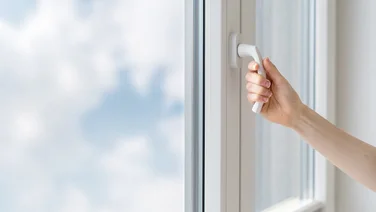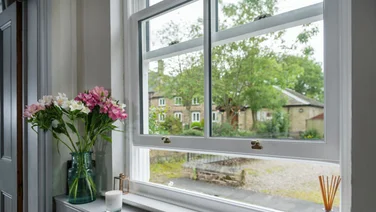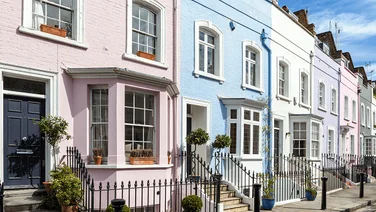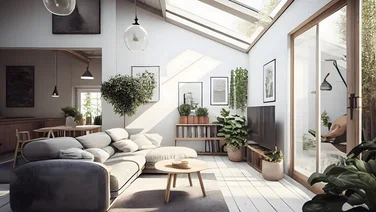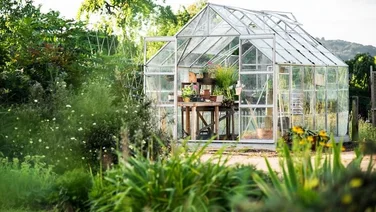- Triple-glazed windows have three panes of glass
- It’s also 10% to 20% more expensive than double-glazing
- Triple-glazing is around 50% more insulating than double-glazing
Double- and triple-glazed windows can not only keep your house warm in the winter but also block external noise, minimize condensation, and enhance security compared to single-glazed windows. Double-glazing costs less than triple-glazing, so you might be wondering if triple-glazing is worth the extra expense.
In this article, we’ll explain all the differences by comparing the costs, benefits, and lifespan of double and triple-glazing. We’ll also touch on which is better, depending on your situation.
Want to skip all the details and just find a double-glazing installer? Then fill in our short form, and we’ll pass it on to qualified installers, who’ll be in touch.
What type of double glazing do you need?
Get started
What’s the difference between double-glazing and triple-glazing?
Both types of multiple glazing offer similar benefits and are great at cutting costs, but there are some key differences between them, which we’ll cover in this section.
- Installation
The first and most obvious difference between double-glazing and triple-glazing is that double-glazed windows have two panes of glass, while triple-glazed windows have three.
In both cases, the space between the panes of glass is relatively thin – only about 16 millimetres or so – and filled with air or an inert gas like argon, krypton, or xenon.
For double- and triple-glazing, the main purpose of having multiple panes instead of one is to reduce drafts and increase heat retention.
If you want to know how much new windows might set you back, look at our double glazing cost calculator.
Both double-glazing and triple-glazing can take anywhere from four hours to three days to install when replacing existing windows.
The speed of installation isn’t affected by how many panes of glass are in a window frame. Instead, installation time depends on how many windows are installed, how large, and their design.
To better understand what this means, one large window, or bay window, can take up to half a day to install. A regular-sized casement window, on the other hand, will usually only take 30 minutes to an hour to install.
- Cost
According to Everest, one of the UK’s largest double-glazing companies, triple-glazing costs 10% to 20% more than double-glazing. On average, triple-glazing costs between £660 and £4,320 per window, whilst double-glazing costs between £600 and £3,600 per window.
Installation costs around £250 a day, so more windows means more time to install, increasing the overall costs of double- and triple-glazing. For example, it costs around £13,120 to replace all the windows in an average three-bedroom house with triple-glazed ones and £11,050 to replace them with double-glazed ones.
If you want to see whether you can get double-glazing grants to help subsidise the costs, check out our guide. The table below shows the average cost of buying and installing double- or triple-glazing based on the number of windows in a property.
Number of windows | Double glazing costs | Triple glazing costs |
|---|---|---|
4 | £5,050 | £5,970 |
7 | £8,650 | £10,260 |
9 | £11,050 | £13,120 |
12 | £14,775 | £17,535 |
16 | £19,700 | £23,380 |
20 | £24,500 | £29,100 |
* Note: these numbers are just estimates. The cost of double and triple-glazing will vary greatly depending on the number of windows a property has the size and design of the windows, the material they are made of, and the time it takes to install them.
- Lifespan
Both double-glazing and triple-glazing have an average lifespan of at least 20 years. But this can vary between as little as 10 and as much as 35 years.
One factor affecting how long double or triple-glazing lasts is their exposure to the elements – frequent exposure to rain or sea air can accelerate degradation.
Poorly installed double or triple-glazing will also last less than 20 years. And certain frame materials, such as uPVC, won’t last as long as other materials, such as aluminium or wood.
Check out our guide to find out more about window lifespans.
- Noise reduction
Triple-glazing might reduce outside noise levels more than double-glazing, but the difference is minimal. In general, double-glazing and triple-glazing provide a 35 to 40 decibels (dB) reduction in noise, essentially reducing outside noise to the same levels as a quiet conversation.
That’s around a 50% noise reduction when compared to single-paned windows. More panes don’t necessarily equal less noise. What matters more is the spacing between the panes, their thickness, and the type of glass they’re made of.
Some glass, such as laminated glass – where a thin layer of polyvinyl butyral resin (PVB) is placed between two panes of glass – is specifically designed for soundproofing. Both double and triple-glazing made of this type of glass can reduce outside noise by over 50 dB.
If you’re interested in financial help, including double-glazing grants for over-60s, have a look at our guide.
Which gives you a quicker return on investment?
Replacing single-glazed windows with modern double or triple-glazing can offer homeowners significant benefits, including energy savings and increased property value. On average, double-glazing (A-rated) can save around £195 annually on energy bills, while triple-glazing (A++ rating) saves about £235.
Although these savings make triple-glazing slightly more cost-effective over time, the overall return on investment (ROI) often depends on property resale. The big advantage lies in improving your Energy Performance Certificate (EPC).
According to a study by moneysupermarket.com, properties with the highest EPC ratings can sell for up to 14% more than those with the lowest ratings. This potential boost in resale value can make upgrading to triple-glazing especially appealing for homeowners looking to maximize their investment.
Triple-glazing also outperforms double-glazing with regards to improving heat retention in your home, typically benefiting from a U-value (a special measure of a material’s insulating properties) of 0.8 compared to double-glazing’s 1.6. That is a 50% improvement in heat retention, which means it is better at keeping homes warmer in winter (if the window is kept closed of course).
It helps maintain a cooler indoor environment in summer by preventing heat transmission from outside, making it ideal for year-round comfort.
While energy savings alone may not cover the cost of installation within the lifespan of the windows, the combination of reduced energy bills, enhanced insulation, and increased property value makes triple-glazing a compelling choice for a quicker return on investment (ROI) compared to double-glazing.
Should you get double-glazing or triple-glazing?
If you can afford the higher cost, you should get triple-glazing. It has all the same benefits of double-glazing, but it’s around 50% more insulating.
For these reasons, triple-glazing is a popular choice in countries that experience very cold winters, such as Sweden and Canada. It can help a home stay warm, and you’ll use even less energy doing so than you would with double-glazing – and less energy means lower energy bills.
That being said, not everyone can afford the extra cost of triple-glazing. And if that’s the case, double-glazing is more than up to the task of insulating a home since UK winters are relatively mild.
The table below summarizes the similarities and differences between double- and triple-glazing.
Category | Triple glazing | Double glazing |
|---|---|---|
Cost | £660 to £4,320 per window | £600 to £3,600 per window |
Return on investment | Increased property value | Increased property value |
Insulation | Provides 50% more insulation than double glazing | Twice as insulating as single glazing |
Noise reduction | 35 to 40 decibels | 35 to 40 decibels |
Lifespan | 20 years | 20 years |
Speed of installation | Four hours to three days | Four hours to three days |
Ease of maintenance | Twice yearly cleaning | Twice yearly cleaning |
What type of double glazing do you need?
Get startedWhich is easier to maintain?
Double-glazed windows and triple-glazed windows are both very easy to maintain. In fact, like most things, regular cleaning and maintenance are one of the cheapest and easiest ways to extend their lifespans.
The windows need to be cleaned at least twice a year – more often if you live near the coast or in a dusty area. A professional can do window cleaning for around £50 to £150, or you can clean the windows yourself with a soft cloth and soapy water or a window cleaning solution.
Of course, there’s always a risk of double and triple-glazed windows breaking or malfunctioning over time. Common issues include difficulties opening or closing windows, locks breaking, condensation problems, or glass breaking or cracking.
If any of these occur, it’s best to contact your installer to have the windows checked and fixed. Repairs cost anywhere from £80 to £300, depending on the severity of the damage.
Another thing to note is that both double- and triple-glazing usually helps reduce condensation. Condensation occurs when the window glass is a lot colder than the inside of the house.
This is much less likely to happen with triple-glazing since having multiple glass panels means the innermost panel (the one in your home) stays relatively warm.
Condensation can still happen with triple-glazing, though.
But if it does, it’s usually a sign that the triple-glazing is defective or that there’s a greater issue with dampness inside the home.

Next steps
Because of its added window panes and air gaps, triple-glazing provides a property with better insulation than double-glazing. That means you’ll use less energy to heat your home and receive lower energy bills.
So, if you can afford triple-glazing, there’s no real reason not to get it. But if you can’t afford the higher costs, don’t worry. double-glazing provides enough insulation for a home to cope with the UK’s winters.
If you think double-glazing is a better option for you, and you want a quote, we can help. Just put a few details into our short form, and our network of professional window installers will be in touch.
Summary
- Triple-glazing saves an average of £235 annually on energy bills, compared to £195 for double-glazing, making it slightly more cost-effective.
- Both double- and triple-glazing improve EPC ratings, with properties rated higher selling for up to 14% more, according to moneysupermarket.com.
- Triple-glazing offers 50% better insulation than double-glazing, reducing heat loss in winter and heat gain in summer.
- Both options reduce external noise by 35 to 40 decibels, though additional panes don’t significantly enhance this benefit.
- Double and triple-glazing typically last 20 years, with longevity influenced by installation quality and environmental factors.
- Triple-glazing costs 10–20% more than double-glazing, with installation times similar for both.


